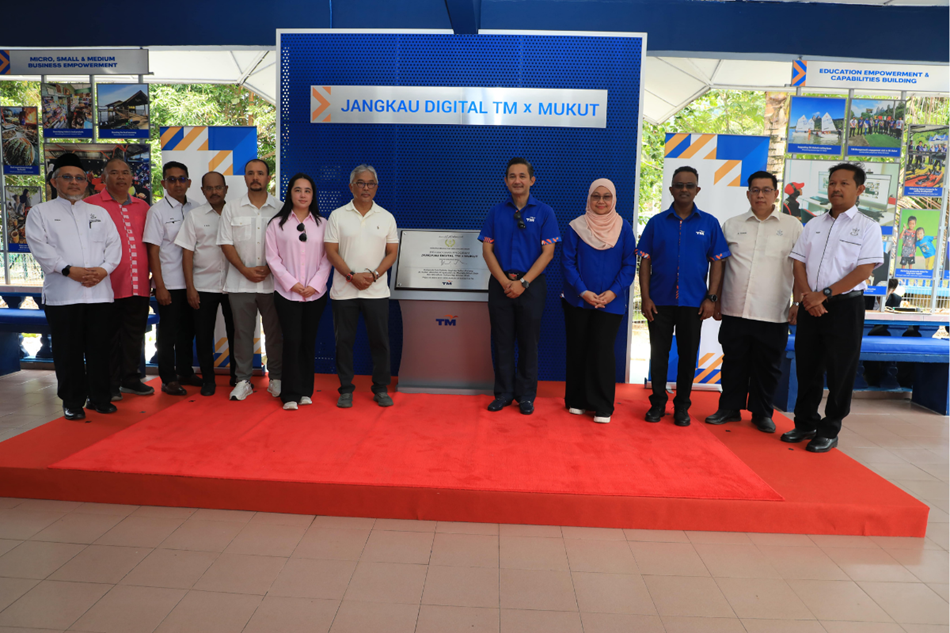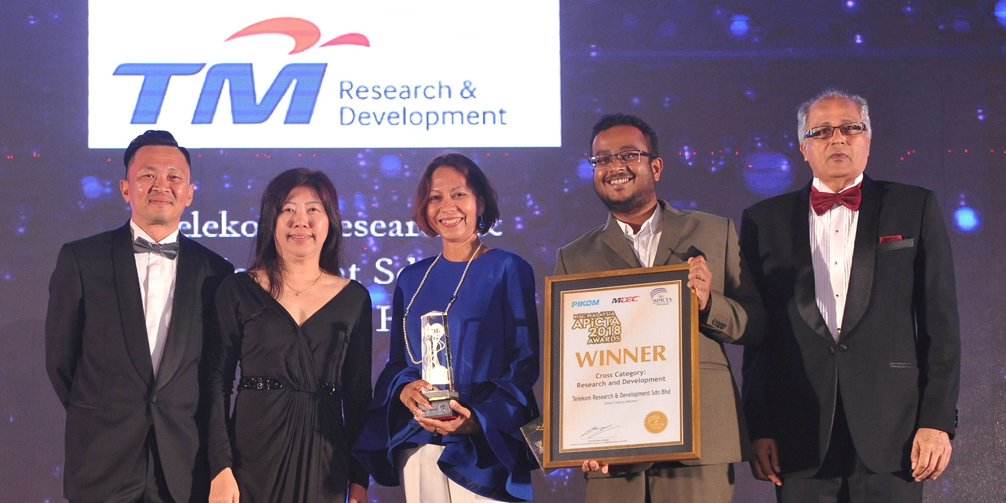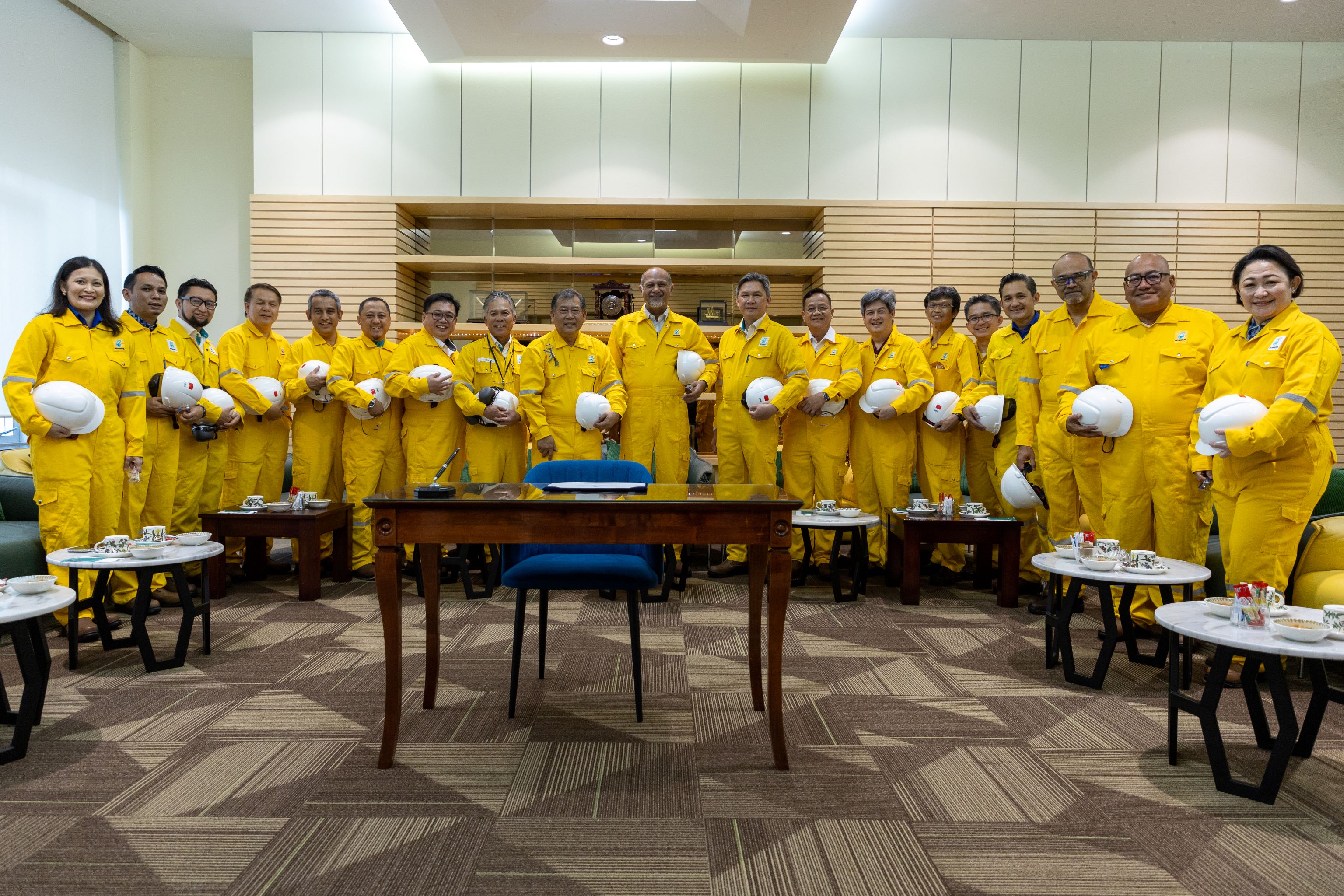BINTULU, 9 AUGUST 2024 – Petroliam Nasional Berhad (PETRONAS) in collaboration with TM inaugurated a Private 5G network at the PETRONAS LNG Complex in Bintulu, Sarawak – signalling further advancements in connectivity and efficiency for the energy industry.
The event was attended by Minister of Digital Gobind Singh Deo, Deputy Minister of Digital Datuk Wilson Ugak Kumbong, Sarawak Deputy Minister of Utilities and Telecommunications Datuk Liwan Lagang, and Digital Nasional Berhad (DNB), the nation’s 5G network provider.
Following the historic launch of Malaysia's first Private 5G network for enterprise at PETRONAS’ Regasification Terminal Sungai Udang (RGTSU) in 2022, the new Bintulu location is one of four of PETRONAS’ sites installed with the technology.
The PETRONAS LNG Complex is one of the world’s largest liquefied natural gas (LNG) plants in a single location with a production capacity of 29.8 million tonnes per annum, and deployment of the 5G network is expected to improve productivity and increase operational efficiency across critical production processes.
In his speech, Gobind Singh Deo emphasised the role of 5G technology in the energy sector transformation, saying, “5G is amongst the key technologies that is gaining importance in the energy sector. The technology, which offers ultra-high speed coupled with low latency communication between control hubs, production sites and vessels, helps to streamline the growing complexity in operational activities. Increased use of 5G-enabled intelligent systems such as industrial IoT, drones, robotics, extended reality (XR), and artificial intelligence (AI) enhances operational efficiency and safety.
“Energy companies around the world are racing to modernise their operations, and I applaud PETRONAS, TM and DNB for taking the lead in digitalising Malaysia’s energy sector.”
Meanwhile, PETRONAS Senior Vice President of LNG Assets Abang Yusuf Abang Puteh said, “PETRONAS is positioning itself at the forefront of the global technological race while meeting the evolving demands of the energy landscape. The integration of 5G with the Internet of Things (IoT), Artificial Intelligence (AI), and automation will streamline workflows, increase productivity by automating data collection, while enhancing safety across all levels.”
Amar Huzaimi Md Deris, TM’s Group CEO said, “This private 5G deployment is the next phase in TM and PETRONAS’ long-standing partnership to future-proof its businesses for a sustainable future. Leveraging on advanced technologies like AI, the Enterprise 5G application is expected to yield optimum operational efficiencies for its highly secure reliable connection, real-time monitoring and analytics as well as remote maintenance.
“Furthermore, this collaboration will further catalyse digital innovation and industry adoption which are key to ensure business resiliency in the future and this intent is also aligned with TM’s aspiration of becoming a Digital Powerhouse by 2030,” he added.
Looking ahead, PETRONAS and TM aim to explore opportunities to transform the energy industry through potentially expanding the distribution of Private 5G networks to newer sites for greater integration and efficiency.
YOU MAY ALSO LIKE

Jangkau Digital TM Reimagines Kampung Mukut, Pulau Tioman as Malaysia’s First Smart Eco-Village, Driving Rural Digital Inclusion and Nation-Building
KUALA LUMPUR, 14 August 2025 – Telekom Malaysia Berhad (“TM” or “the Group”) has identified Kampung Mukut, Pulau Tioman as the first village for its inaugural Jangkau Digital programme, reimagining the small coastal settlement as a Smart Eco-Village that blends digital connectivity, economic empowerment, education, and environmental stewardship. The initiative is aligned with the Government’s call for organisations to contribute in uplifting rural communities through sustainable and inclusive development. Home to just over 100 residents, Kampung Mukut is renowned for its crystal-clear waters, lush rainforests, serene waterfall, and the towering Dragon Horns of Tioman. Its remoteness has also meant limited access to connectivity and public infrastructure, challenges that Jangkau Digital seeks to address while preserving the village’s unique culture and biodiversity. The programme in Mukut was officially launched by His Royal Highness The Sultan Pahang, Al-Sultan Abdullah Ri’ayatuddin Al-Mustafa Billah Shah, during his recent visit to the village. Amar Huzaimi Md Deris, TM’s Managing Director and Group Chief Executive Officer said, “Jangkau Digital TM is about building the right foundations for communities to thrive, from expanding digital access, to unlocking new economic opportunities, nurturing future-ready talent, and safeguarding environment. It reflects our role as a nation builder, ensuring that even the most remote communities are part of Malaysia’s digital future. In Mukut, we are working closely with the community and the Tioman Development Authority as our strategic partner to demonstrate that rural and island villages can progress sustainably, while preserving the heritage and natural beauty that make them unique.” Digital Foundation for Inclusive Growth The transformation begins with robust digital infrastructure across Pulau Tioman. The 75km submarine cable from Kuala Rompin that was deployed by TM, forms the backbone that connects the entire island to Malaysia’s national digital network, effectively bringing the world to Tioman and Tioman to the world. This is followed by the rollout of high-speed fibre broadband and expanded mobile coverage that now reaches all key settlements and tourism hotspots. This upgrade ensures that residents, businesses and visitors across Tioman enjoy stable, high-quality internet access, a critical enabler for economic activity, education, and tourism. In Kampung Mukut, this connectivity has been further strengthened with the installation of outdoor WiFi spanning the village from the jetty and school to the mosque, eateries, homestays, and along scenic trails, enabling tourists to navigate, locals to run online businesses, and students to participate in virtual learning without interruption. Complementing this, TM’s Vision AI CCTV systems have also been deployed at strategic points to improve public safety, manage visitor flows and support responsible tourism in line with Mukut’s eco-tourism appeal. MSME Empowerment & Economic Upliftment With strong digital connectivity as the foundation, entrepreneurs in Mukut are now better positioned to tap into the digital economy. Tourism operators, guesthouses, and boat service providers have been onboarded to visitmukut.com – a community-managed tourism portal powered by TM and enhanced with AI to deliver an end-to-end experience, from discovering Mukut’s natural beauty to booking and engaging with local operators. This is integrated with the Unifi Business Go Bookit app for seamless visitor experiences. This transition to online visibility is strengthening business resilience, particularly for operators who once depended solely on walk-in visitors. To support this shift, TM will conduct targeted training sessions to equip local MSMEs with skills in booking management, social media promotion, and digital content creation, with additional support extended to B40 entrepreneurs via the Sejahtera MADANI programme. By building these capabilities, TM aims to ensure that the economic benefits of tourism are shared more broadly across the community, while positioning Mukut as a destination that is digitally accessible. Equipping Students and Teachers for the Future The Jangkau Digital TM also brings the TM Future Skills (TMFS) to SK Mukut as the Champion School. SK Mukut is now linked to SMK Tekek, Tioman’s “nucleus” digital hub school, enabling resource-sharing and access to advanced digital tools. Through this collaboration, students are exposed to coding, robotics, 3D printing and AI learning modules – subjects that previously seemed out of reach in rural settings. Teachers in Mukut also benefit from training programmes that help them integrate STEM content into lessons and maximise the use of digital tools. Beyond the classroom, TM is investing in capability building for the community’s core sporting tradition - sailing. Efforts include upgrading essential infrastructure such as dedicated walkway and slipway to provide safe and convenient access to the waterfront. The Group also goes the extra mile by providing a comprehensive coach training and talent development programme, and providing official sports attire for the school’s sailing team. These initiatives are designed to inspire the students, enhance competitive readiness, and cultivate a new generation of talent capable of competing at the highest levels. This integrated approach ensures that Mukut’s youth can excel both in academics and in sports, proving that rural communities can nurture future champions on multiple fronts. Preserving Environment and Biodiversity In preserving Mukut’s charm, TM is embedding environmental stewardship into every aspect of development. The village’s coral reefs, rainforest trails, and marine biodiversity are recognised as irreplaceable assets, and planned coral protection and trail conservation programmes will ensure these remain intact for future generations. TM’s sustainability commitment extends to the seabed where the presence of submarine cables naturally fosters the formation of artificial reefs, providing vital habitats for marine life and cultivating to long-term biodiversity ecosystem. To further support eco-tourism safety, TM is enhancing measures to ensure the safety of both tour guides and hikers on treks to the Dragon Horns including providing GPS trackers and other digital solutions, helping Mukut maintain its reputation as a safe, well-managed destination for adventure tourism. By combining digital technology with environmental care, Jangkau Digital TM reinforces the idea that progress in rural communities can go hand in hand with sustainability. Greater Purpose of TM “Our aspiration to become Malaysia’s Digital Powerhouse by 2030 is grounded in our greater purpose to enable progress that is inclusive, sustainable, and meaningful for all. When students in Mukut can explore robotics, local entrepreneurs can reach customers worldwide, and young athletes can train for national glory, all while preserving their environment, we see the true value of digital transformation. Jangkau Digital TM in Mukut is just the beginning, and we are committed to extending this progress to other rural islands and communities across the nation,” concluded Amar.

Unlimited Support For Harimau Malaya With Unstoppable Uni5g
KUALA LUMPUR, 12 October 2023 – TM is pleased to announce an immersive digital experience that can be enjoyed by local football fans and Harimau Malaya supporters in a combined effort with the Football Association of Malaysia (FAM). As the Official Technology Partner for FAM and Harimau Malaya, TM, through Unifi Mobile, has teamed up with Fresnel Group of Companies to revolutionise the home football viewing experience. With innovations such as 360° Live Streaming of matches and a Virtual Reality (VR) Tour of the National Stadium Bukit Jalil powered by 5G, fans will enjoy an enhanced experience when cheering for our national team during the upcoming Pestabola Merdeka, both at home and on-the-go. On 13th October, fans can experience the Malaysia vs India match from diverse angles in a stunning 8K quality made possible through 360° Live Streaming, enabled by 5G technology. This immersive experience is delivered through dual 360° cameras strategically positioned at the National Stadium Bukit Jalil’s grandstand and goalposts, offering a one-of-a-kind viewing experience that allows fans to be virtually part of the action and feel the pulsating energy of the stadium. Malaysians are invited to immerse into this experience by tuning in to Unifi’s YouTube channel (youtube.com/@UnifiYourWorld) or visiting unifi.com.my/harimaumalaya. Hardcore football enthusiasts should also not miss the opportunity for an interactive VR Stadium Tour, exclusively accessible through Unifi Mobile Prepaid’s Limited Edition Harimau Malaya starter packs. This unique experience offers fans the chance to explore National Stadium Bukit Jalil – the proud home of Harimau Malaya. Fans will gain access to iconic behind-the-scenes locations including locker rooms and training facilities, previously unseen by the public. Through UNI5G, fans can virtually experience the excitement of the pitch as if they were physically present there, all from the comfort of their own homes or while on the go. Shanti Jusnita, TM’s Chief Marketing Officer said, “We are proud to partner with FAM and Fresnel Group of Companies in supporting Harimau Malaya and our local football scene. We have always seen football to be a bridge where Malaysians come together to support our Harimau Malaya team. As an enabler for Digital Malaysia, we are doing our part to innovate the digitisation of home football by bringing 5G applications and experiences to Malaysians through our UNI5G.” Unifi has been crowned the 2023 award winner by Ookla® for delivering the best mobile video experience in Malaysia. As the nation comes together to rally behind our Harimau Malaya team during Pestabola Merdeka, fans can be confident they are backed by the nation’s leading mobile video experience provider. In addition, through the Unifi Mobile Roar Louder campaign, fans visiting the Unifi Mobile booth at the Pestabola Merdeka from 13 to 17 October will have an exclusive chance to grab the coveted Limited Edition Harimau Malaya Jersey, Harimau Malaya Mafla, general access tickets and an instant RM5 cashback when they purchase UNI5G Prepaid Monthly Unlimited Plan, which includes Unlimited 4G+5G Data, Unlimited Calls and 5GB Hotspot – all for only RM45. Datuk Haji Hamidin Haji Mohd Amin, President of FAM said, “We are glad to see the efforts and outcome from the partnership we have with TM at this point. We are excited to present to our local football fans this 360° immersive viewing experience. Offering this experience with the long missed Pestabola Merdeka will hopefully be something unforgettable.” Fans are also invited to visit the Unifi Mobile booth at the National Stadium Bukit Jalil on 13 - 17 October to participate in various exciting activities. To know more about Unifi Mobile Prepaid and its exclusive offering, visit unifi.com.my/prepaid. *Unifi is Malaysia’s Speedtest Awards™ winner for Best Mobile Video Experience during Q1-Q2 2023 period. Based on analysis by Ookla® of Speedtest Intelligence® data for Q1–Q2 2023. Ookla trademarks used under license and reprinted with permission.

TM R&D wins prestigious MSC Malaysia APICTA 2018 for the innovation of Smart Safety Helmet
Places TM R&D as the Champion of Research & Development in 2018 TM Research & Development (TM R&D), the research arm and a wholly-owned subsidiary of Telekom Malaysia Berhad (TM) recently won the Cross Category: Research & Development for its innovative Smart Safety Helmet during the 19th MSC Malaysia Asia Pacific ICT Awards (MSC Malaysia APICTA) 2018 organised by the National ICT Association of Malaysia (PIKOM). Winning this prestigious award places TM R&D as the champion of Research & Development in 2018. In addition, TM R&D has been selected to represent Malaysia in the Cross Category: Research & Development at the International APICTA Awards 2018 in Guangzhou, China. Present to accept the award was Dr. Sharlene Thiagarajah, Chief Executive Officer of TM R&D. Developed by TM R&D, Smart Safety Helmet is a data driven smart industrial or safety helmet, an Internet of Things (IoT) solution that provides live, wireless monitoring and array of sensors including accident impact and geolocation which can be used to perform various analysis towards creating a safer worksite. It sends telemetry to the cloud and processes the data for the benefit of the employer as well as the staff. It has all the safety helmet features, location tracking services, attendance, violation detection and a video camera for remote coaching and emergency observation of the workforce. This Smart Safety Helmet innovation is the first Smart Safety Helmet in Malaysia and it is now ready to be deployed for industry players across various sectors such as Oil & Gas, Construction, Chemical & Manufacturing Industry and many more. Commenting on the milestone achievement, Datuk Bazlan Osman, Acting Group Chief Executive Officer of TM said, “We are excited and thrilled to know that TM R&D has won the award. It was such a great honour and it is the first of many other innovations that will be introduced by our R&D arm. We are certainly proud of this recognition and TM R&D’s outstanding achievement in the ICT industry.” “TM will continue to introduce more innovative and converged propositions to empower Smarter Living, Smarter Businesses, Smarter Cities, Smarter Communities and a Smarter Nation - delivering a seamless digital experience and integrated business solutions to cater to individual lifestyle and business communication needs - towards making “Life and Business Easier for a Better Malaysia”,” he added. Meanwhile, Dr. Sharlene shared, “It is indeed a proud moment for us at TM R&D, as well as for TM Group. We have received tremendous interest for its novel design and unique key features that promote safety and collaboration while working on the field, regardless of industry. The invention of this smart helmet without doubt will increase operational efficiency at the work place and enhance productivity level of the workforce.” The Smart Safety Helmet started off as a challenge in speed and innovation, where the team worked towards creating a first working prototype within two (2) weeks. It later became part of one of the five (5) pillars of smart solutions under the Memorandum of Understanding (MOU) signed between TM and Petronas to increase operational excellence and enhance customer experience. Gaining huge interests from large corporations, the Smart Safety Helmet was invited to be featured at the recent 4th Malaysia Oil & Gas Services Exhibition and Conference (MOGSEC) as part of TM’s product showcase. MSC Malaysia APICTA provides recognition to outstanding achievements of individuals, students, entrepreneurs, SMEs and organisations with operations in Malaysia who have contributed to the development of the MSC Malaysia initiatives or in building applications and services for the benefit of Malaysia. It recognises creativity, innovation, and excellence in the Malaysian ICT arena. MSC Malaysia APICTA also provides an opportunity and an ideal environment for individuals and companies to gain local, regional and international exposure through on-going promotional activities, and through participation at the international Asia Pacific ICT Alliance Awards (APICTA). Winners of the MSC Malaysia APICTA Awards will represent Malaysia at the annual International APICTA Awards. For more information about TM R&D and its products and services, log on to www.tmrnd.com.my


